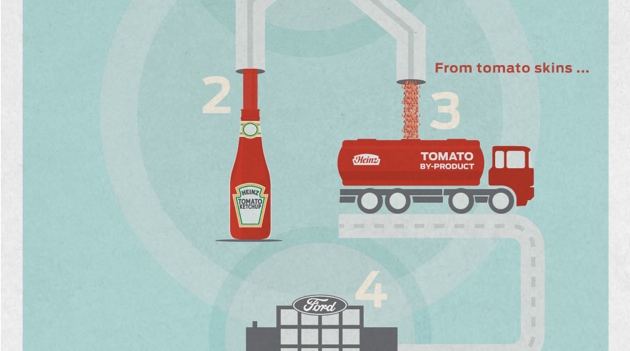
Tomato byproducts could be built into your next vehicle
Food in Canada
Research & Development Fruit & Vegetables carousel H.J. Heinz Company tomatoesHeinz and Ford will research using tomato fibres to develop sustainable composite materials to be used in vehicle manufacturing

Dearborn, Mich. / Pittsburgh, Penn. – Ford Motor Company and H.J. Heinz Company have partnered up for research.
If you’re wondering what they could possibly have in common, you’re not the only one.
And yet what they have announced makes perfect sense. Researchers at both companies are going to see if they can put tomato fibres to good use. In other words, they’re investigating developing sustainable composite materials with those tomato fibres that they can then use in vehicle manufacturing.
Specifically, dried tomato skins could become the wiring brackets in a Ford vehicle or the storage bin a Ford customers uses to hold coins and other small objects.
“We are exploring whether this food processing byproduct makes sense for an automotive application,” said Ellen Lee, plastics research technical specialist for Ford. “Our goal is to develop a strong, lightweight material that meets our vehicle requirements, while at the same time reducing our overall environmental impact.”
This type of collaboration isn’t new. Almost two years ago, Ford joined up with Heinz and other companies such as Coca-Cola Company, NIKE Inc. and Procter & Gamble to form the Plant PET Technology Collaborative or PTC.
PTC is a working group that is focused on accelerating the development and use of 100 per cent plant-based PET materials and fibre in their products. PTC was building upon the success of Coca-Cola’s PlantBottle packaging technology, which is made partially from plants and is more environmentally friendly compared to traditional PET plastic bottles. Heinz already licenses the technology from Coca-Cola for select Heinz ketchup bottles in Canada and the U.S.
At Heinz, researchers were looking for innovative ways to recycle and repurpose peels, stems and seeds from more than two million tons of tomatoes the company uses each year.
“Although we are in the very early stages of research, and many questions remain, we are excited about the possibilities this could produce for both Heinz and Ford, and the advancement of sustainable 100% plant-based plastics,” says Vidhu Nagpal, associate director, packaging R&D for Heinz.
Image from Ford Motor Company website
Print this page